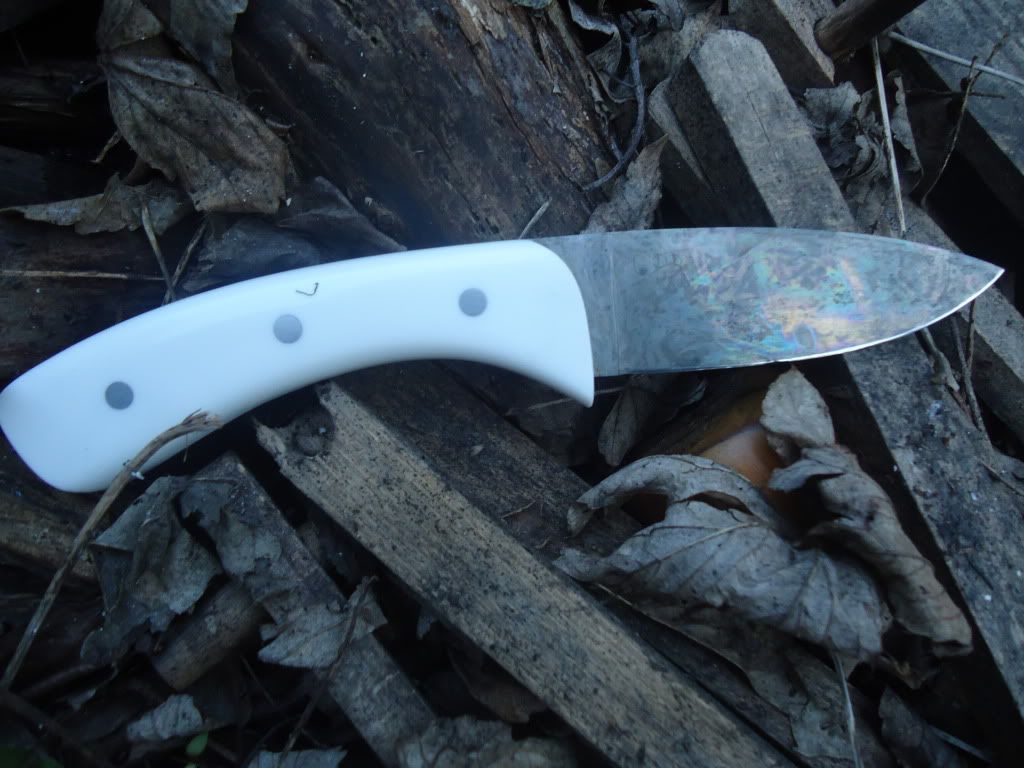Results 1 to 10 of 17
Thread: Creating controlled patina?
-
12-29-2011, 05:15 PM #1Member

- Join Date
- Sep 2011
- Posts
- 57
Thanked: 6 Creating controlled patina?
Creating controlled patina?
I have an older blade that just seems to have a propensity to rusting, even stored in my dry box with all of my other razors that are just fine and not rusting at all! I think the different steel is part of the problem, but anyway, as an older blade I wouldn't mind it having an aged look, and I was wondering if anyone has ever intentionally created a tarnish on the blade and how they do it.
I know that a nice patina protects the underlying metal from rust, but I have never heard of a way to create that layer.
Any tips are appreciated!
-
12-29-2011, 05:25 PM #2Senior Member


- Join Date
- Jan 2011
- Location
- Roseville,Kali
- Posts
- 10,432
Thanked: 2027
You could rust blue it with acid,or you could use ferric Chloride.
-
12-29-2011, 05:47 PM #3Member

- Join Date
- Sep 2011
- Posts
- 57
Thanked: 6
Well google helped me out on this one! I'm going to try a towel soaked in vinegar. Hopefully this will give me a bit of variation and should protect the steel. Without a buffer or the patience for hand sanding, I was never going to get it to shine anyway, so I'll let it keep its character, embrace its antiquity, and protect it as best as I can. However, first I need to reverse my mediocre attempts at making it new again!
I'll post before and afters, dont worry!
-
12-29-2011, 09:52 PM #4

I 've created a little bit of patina before on one just used cold bluing compound on the entire razor then just carefuly polish with mothers and a rag repeat bluing and mothers until you get the desired effect .Takes most of the blue off but still leaves some patina like blue black haze behind. I ended up doing this for the same reason as you i had an old W&B that was realy pitted just had to many pits to remove and the simulated patina helped make it look pretty cool.Hope this helps
-
12-29-2011, 10:09 PM #5

I love patinas, I've spent time experimenting on knives I've made as shiney doesn't suit all blades in my opinion. This is true of vintage razors in my mind as well, some just look better with a nice patina. You can get different effects with household products, this was English mustard wrapped in cling film for the pattern effect and left overnight, terrible pic but it looks like a drop of gas in a puddle in the light;

The easiest way I've found is to use salad cream(mayonnaise) wiped on the blade and left overnight. You can then wipe it off and apply another coat and leave during the day, wipe off and leave overnight repeatedly until the desired darkness is achieved. The great thing is you can always polish the patina off with Autosol or similar if you don't like it. You can get some great patterns using garlic flakes as well as vinegar but that will pit the steel so best not used on a razor unless you're after a rustic fresh off the forge hammered look...
Have fun experimenting and show us your progress if you go ahead with it!
-
12-29-2011, 10:27 PM #6

Lemon juice will also work . I think just about anything that's mildly acidic will work .
Greetings , from Dundalk , Maryland . The place where normal people , fear to go .
-
12-29-2011, 11:45 PM #7

Have you ruled out celluloid rot as a cause of the persistent rusting? If the rusting occurs along the blade where it fits into the scales, and they are made of celluloid, likely the scales are decomposing. Caution, if the razor has celluloid scales I would segregrate it from other celluloid scaled razors until you rule out celluloid rot, because the off gassing of celluloid rot can start the process of decomposition in surrounding celluloid scales.
-
The Following User Says Thank You to Croaker For This Useful Post:
Sasquatch (12-30-2011)
-
12-30-2011, 12:35 AM #8Member

- Join Date
- Sep 2011
- Posts
- 57
Thanked: 6
I'll get pictures up later tonight, I experimented with painting a design on with mustard and then evening it out with vinegar. I think I like the vinegar better, it looks more natural, so it might be due for a bit of polishing then a re-staining later.
Definitely wasnt cell rot, scales were wood, and the scales I put on were also wood. The original scales are soaking in mineral oil right now to seal them up a bit!
Overall I like this, its easy enough to play around with, and mistakes are way easier to correct than if I were to try to buff or sand the blade!
-
12-30-2011, 11:41 AM #9
-
12-30-2011, 05:18 PM #10

Rust is the natural preventive for steel just that as time goes by it goes from preventive to destroyer. Altering the finish might change the appearance but will do nothing to protect it. You can use a treatment like bluing or some others to protect the steel but just using something to darken the steel won't offer protection from rust. In the end you need a barrier from the O2 in the air so it doesn't kiss the blade directly.
No matter how many men you kill you can't kill your successor-Emperor Nero


 7Likes
7Likes LinkBack URL
LinkBack URL About LinkBacks
About LinkBacks






 Reply With Quote
Reply With Quote

